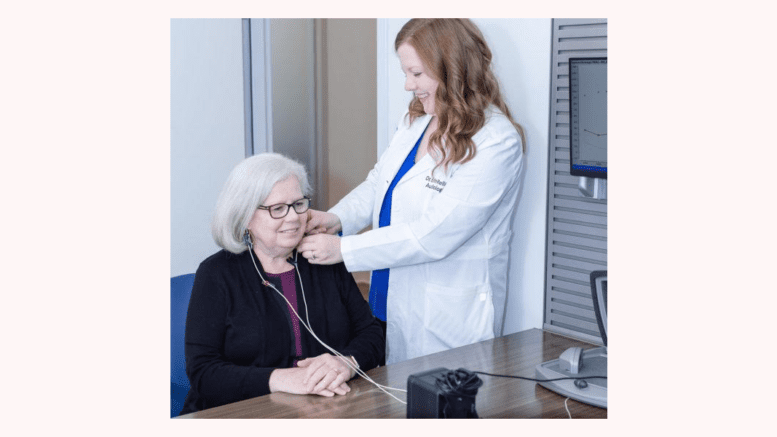On October 17, over-the-counter hearing aids became available from retailers. The availability was due to a change in rules from the Federal Trade Commission. Among the retailers who plan to sell the devices are Walmart, Walgreen’s, CVS and Best Buy.
The Courier spoke with Dr. Erin Rellinger, an audiologist at Eye Consultants of Atlanta Hearing Center in Cobb County’s Cumberland area, who expressed caution about the devices.
“The big thing that has kind of been surprising to us watching the media coverage of it, because it has just exploded, is how misleading it is on a couple points that as audiologists we’re just worried about (involving) consumer safety,” Rellinger said.
“The whole point of the OTC Act was access and affordability,” she said.
“And now that these are out over the past couple of weeks, we’re just horrified that the most prominent OTC devices are more expensive than a professionally-dispensed, programmed, custom-made entry-level device,” she said.
“The whole point of the legislation was affordability. And really what happened? How did these companies come in and release these horribly expensive devices?” she asked.
“So these over-the-counter devices are up to $3,500 a pair? The entry level ones are around six to $800 a pair and so they’re not just these inexpensive little devices to try,” said Dr. Rellinger. “So our concern is that by the time the patient has gone that route, they’ve already spent more money than if they had just started with an audiologist.”
The Courier asked how a customer would find lower-cost devices dispensed by an audiologist.
“You just have to ask for them,” she said. “A medical office has every price point in every budget.
“I would say that, on average, consumers tend to want your higher end products because they want all the bells and whistles.
“But these price points have been around for years, we fit a ton of them, they’re very successful.
“Not everybody needs all the bells and whistles, but just needs to hear.
“So entry level devices are available from all of our major hearing aid companies professionally fit. So we’re just kind of horrified for the public.
“And you know, as a local county resident I want to protect my neighbors and family and friends from spending all that money, not being successful, because the guidelines are really vague.
“There’s a lot of kind of inappropriate use, and we ultimately expect these people to end up needing professional care.
“The OTC device is kind of the entry way into the hearing healthcare space. It’s not a long term solution.
“It’s just to get them comfortable with amplification and get people the care they need.
“But long term, as their hearing loss progresses, they will need an audiologist … for their whole life. And so it’s just kind of delaying their appropriate care.
The Courier asked what the difference is between a lower-priced and higher-priced professionally-fitted device
“There’s a lot of features that are available in the higher priced products such as background noise reduction, wind block, echo features that make the hearing aids just sound better in a noisy environment.
“For people that have a mild hearing loss, which is what OTC is intended for, they often don’t struggle a lot (with background noise), they just struggle a little.
“An entry level product is designed for quieter environment. So an entry level lower cost hearing aid will do great in a quiet environment.
“As we go up in price point, they’ll do better in more background noise and competitive situations.
“So the more you pay tends to be the more features for speech understanding, and the flexibility of the device for the programming.”
The Courier asked if insurance covers hearing tests from an audiologist.
“Not usually. So most of our patients that need hearing aids, I think it’s safe to say the majority are Medicare patients.
“Medicare doesn’t cover anything for the purpose of a hearing aid.
“So even even a hearing test done because somebody thinks they need hearing aids is excluded from Medicare coverage. Commercial insurance will occasionally pay … but very rarely.”
The Courier asked if the rules changes were likely to affect the revenue of audiology practices
“That’s kind of what people are focusing on in the news: ‘Oh, no audiologists are done for,’ and it’s really actually the opposite.
“Fact of the matter is, there’s not enough of us for all the people aging.
“(It takes) eight years to go to school and a lot of money to become an audiologist.
“So as the aging population is growing with us every day, more and more people are turning 65.
“There’s not enough of us. It’s not at all going to impact our practice, we have a long wait. There’s more patients than we can handle.”
The Courier asked if there was anything else Dr. Rellinger would like to leave readers with.
“I think another important part that is missed so far is just a reminder that hearing loss is not normal. It is a medical condition.
“I think we’re kind of downplaying this and treating hearing more as a consumer electronics (issue). The hearing healthcare profession has tried really hard to normalize hearing loss. But essentially, it’s a deficit to the auditory nerve tissue.
“So we need to figure out why people have hearing loss when they come in and are diagnosed because there’s often a reason and another comorbidity that we need to medically manage.
“If someone is 45, and goes to treat themselves with an over-the-counter hearing aid, without seeing an audiologist, something’s wrong, why do they have hearing loss?
“There’s something else we’re missing. So I would stress that everybody needs a medical evaluation before they pursue an over-the-counter hearing aid. Even if that’s what they do, that’s fine.
“But they should see an audiologist to make sure there’s nothing nothing underlying. There are a lot of very prevalent medical issues like cardiovascular disease that show up in a hearing test.”

